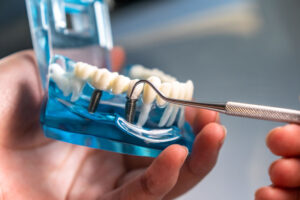
Have you ever wondered if you were at risk for gum disease? Maybe you’ve never thought about it, but there’s a chance you have one or more factors that could be putting you at risk. Gum disease is a progressive condition that begins with symptoms many disregard as normal. Tender, red, and bleeding gums are the first sign of gingivitis, the beginning stage of periodontal disease. Gum inflammation is caused by a build-up of bacteria-releasing plaque and tartar on the teeth. As the disease progresses, gums become more damaged, pulling away from the teeth, which can become loose and even fall out. If the gum tissue and bone are significantly damaged, it takes surgery to repair these structures and bring health back to your mouth. Knowing the common risk factors for gum disease, however, can help prevent this condition from harming your smile and health!
Poor oral hygiene
The most common cause of gum disease is a buildup of calculus on the teeth, which releases toxins that infect and inflame the gum tissues. This buildup is often the result of poor oral hygiene, where improper brushing and flossing (or no brushing and flossing at all) do not remove this sticky plaque from the teeth. Similarly, not visiting your dentist twice a year for cleanings can increase the risk for gum disease, too.
Smoking or tobacco use
Smoking has been proven to weaken the body’s ability to fight infection, making it more difficult to treat gum disease and for the gum tissue to heal once you’ve been diagnosed. Smokers are twice as likely to develop periodontal disease in their lifetime, according to a study published in the Journal of Dental Research, so excellent dental habits are a must. If you do smoke, quitting can save your smile, improve your overall health, and reduce your risk for diseases far worse than gum disease.
Age and genetics
Unfortunately, there are two risk factors that no one can avoid: age and genetics. As we age, bodies naturally become more susceptible to infection and disease, increasing the risk for gum disease. Similarly, hereditary can put you at a greater risk for gum disease, especially if close family members have the condition already.
Systemic diseases
Underlying systemic diseases, including diabetes, rheumatoid arthritis, and heart disease, all negatively affect the body’s inflammatory system and compromises the immune system. The connection between gum disease and systemic conditions is circular. Where gum disease can increase the risk for systemic problems, so can systemic conditions make gum disease more likely. Since these conditions are treatable or can be managed, seeking the proper periodontal and medical care is critical.
Medication use
Certain medications, such as anti-depressants and some heart medicines, can cause dry mouth. A reduced level of saliva in the mouth makes it more difficult to wash away food debris from the teeth. Saliva also contains strong antibodies that help fight bacteria, so a reduction in saliva increases the risk for cavities, and at the worst, periodontal disease.
Teeth grinding and clenching
If you chronically grind and clench your teeth (bruxism), you could be putting yourself at risk for developing gingivitis. Whether involuntary or due to stress, bruxism puts a lot of strain on your teeth, causing them to loosen and create pockets between the roots and the gum tissue. If bacteria collect in these pockets and is not removed, gum disease can develop.
Poor nutrition and health
Not surprisingly, there is a correlation between malnutrition or poor health habits and an increased risk for oral health problems like gum disease. Without proper nutrients, it becomes increasingly more difficult for the body to fight off viruses and disease due to a weakened immune system. Similarly, a diet high in starches, sugars, and carbohydrates can weaken tooth enamel, making them more likely to collect bacterial plaque that leads to gum disease.
Wondering if you’re at risk?
Catching periodontal disease before it becomes severe is the best way to prevent permanent damage to your gums, bone, and teeth. If you think you’re at risk for gum disease or are experiencing symptoms like bleeding gums or gum recession, schedule your appointment with us today.




